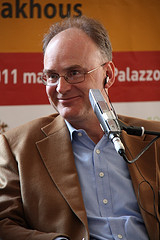 Matt Ridley, the UK author, journalist and member of the House of Lords, recently wrote a Wall Street Journal article in which he provocatively avers that the “world’s resources aren’t running out.”
Matt Ridley, the UK author, journalist and member of the House of Lords, recently wrote a Wall Street Journal article in which he provocatively avers that the “world’s resources aren’t running out.”
He asks: “How many times have you heard that we humans are ‘using up’ the world’s resources, ‘running out’ of oil, ‘reaching the limits’ of the atmosphere’s capacity to cope with pollution or ‘approaching the carrying capacity’ of the land’s ability to support a greater population? The assumption behind all such statements is that there is a fixed amount of stuff—metals, oil, clean air, land—and that we risk exhausting it through our consumption.”
Ridley takes the view that this not happening, at least not at the crisis level that some believe it is happening. He says we “burst through such limits again and again.”
He goes on to explain the idea of niche construction: “people (and indeed some other animals) can create new opportunities for themselves by making their habitats more productive in some way.” Agriculture is a good example of this, and he notes that economists call this innovation. Ridley’s argument, is that innovation creates new and welcome uses for resources and extends their life.
You know how I feel about the collaborative and crucial role of innovation in the Vested framework. Ridley’s basic premise that innovation is key to solve wicked problems, does not cancel out the fact that many of the world’s basic resources are indeed dwindling.
Unfortunately, Ridley’s article does not have an answer for what should be done when we may indeed face an elimination of resources. Ridley’s thinking? “I nowadays lean to the view that there are no limits because we can invent new ways of doing more with less,” he says.
Ridley goes on to talk about the “tribes” of ecologists and economists and challenges them to come together to solve the world’s resource issues. “If I could have one wish for the Earth’s environment,” Ridley concludes, “it would be to bring together the two tribes—to convene a grand powwow of ecologists and economists. I would pose them this simple question and not let them leave the room until they had answered it: How can innovation improve the environment?”
While I love Ridley’s optimism, I do have to pause and think, is he being too optimistic, too simplistic? Heck, even the sun will eventually burn itself out no matter how many solar panels are built or how much solar energy is stored in batteries that eventually will be tapped out. Maybe instead of trying to do more with less – his “tribes” could develop different and truly innovative (not just more efficient) approaches that will stop draining the earth’s resources.
Regardless – I am excited to see someone of Ridley’s stature promoting collaboration and innovation as a key approach for solving some of the world’s toughest challenges. Ridley may be overly optimistic – but then again I think people would say that about John F. Kennedy’s dream to put a man on the moon.
Ridley, if you are out there reading MY work, I’d love to share more about how the Vested methodology can lead to way to HOW to turn your wish into reality! If you know Ridley tell him I’ll send him my books for free if he wants to learn more!
Image: Matt Ridley 4 by Genova città digitale via Flickr